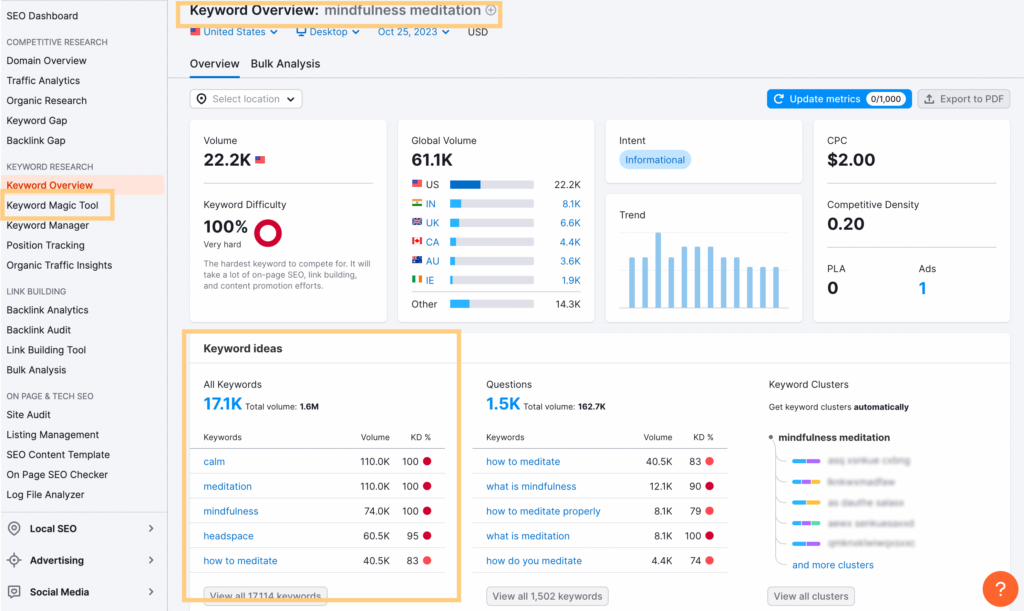What Are Secondary Keywords?
Secondary keywords are terms that are relevant to, but different than, your primary keyword. They can play many roles in helping your content perform better, especially as a mental wellness organization that creates content to educate and support. Here’s what you need to know about secondary keywords and how you can leverage them to create better content.
What is Keyword Research
First, it’s important to know the terms keyword research and primary keyword.
- Keyword research is the process of finding a keyword that’s relevant to your audience and the topic. There are many tools to facilitate this. My personal preference is SEMrush.
- Primary keyword is the main term you’re targeting with your piece of content. This is the keyword that you’ll include in your H1, at least one H2, and metadata. In other words, this is what you’re page is built around. The keyword you choose for this should have low difficulty and high search volume and be relevant to your niche and audience.
Doing keyword research correctly is how you stand out in search and improve your ranking so you can drive more organic search traffic.
Do You Need Secondary Keywords?
In writing great content, you may naturally target secondary keywords without even realizing it because they’re hyper-relevant to the main keyword. As you create in-depth content, like blog posts, around that main topic, you’ll likely naturally mention these terms. For example, if you’re talking about “trauma-informed therapy,” you may naturally get into topics like “how trauma is stored in the body” or “trauma healing.”
When you get intentional about weaving these search terms into your content, however, you can elevate each piece of content to be more thorough and rank for more keywords in search.
Here are a few ways they can support your piece of content.
Cast a Wider Net
When you write a piece of content, your goal is to rank for the primary keyword. When you target secondary keywords throughout the content, you cast a wider net by increasing your chance to rank for those terms and others related to them. I love how SEMRush explains this:
“If you liken SEO to going fishing, then focusing on a primary search term alone is like having just one reel in the water – by contrast, adding secondary keywords is like having dozens (or more) reels in the water. You may or may not catch that giant fish you were hoping to, but you will reel in something.”
Be More Thorough
You can use secondary keywords to determine subtopics that are important to include in the piece of content. For example, if your primary keyword is “mindfulness meditation” a secondary keyword might be “how to meditate.”
Using the same example, you may include a “how to meditate” section in your article about mindfulness meditation. From here, you can also link to relevant content, like a meditation guide, on your website to get even more SEO value from that piece of content.
How Do You Find Them?
You can find secondary keywords in most SEO tools, including Ahrefs and SEMrush. Within SEMrush, you can find secondary keywords on the main keyword page, in the Keywords Ideas section, or within the Keyword Magic Tool where you’ll find thousands of other relevant keywords.
You can also find secondary keywords through Google Autocomplete or tools like Answer the Public.

How Do You Choose These Keywords?
As a secondary keyword, you don’t have to worry as much about the search volume and difficulty of these terms—but it still helps to focus on those that have high search and low difficulty. This will give you the best chance at ranking for them.
Use this framework to choose 2-3 secondary keywords to focus on within the content, knowing that you’ll naturally rank for many other keywords if the content is well-written and thorough.
Secondary Keywords Can Make Your Content Better
Secondary keywords will naturally be a part of your content if it’s thorough and well-written. It never hurts to get more intentional with these, however, to cast a wider net while also making sure you’re covering all relevant aspects of the topic. For mental wellness brands, standing out in search and creating content that truly educates, is so important—so don’t ignore this aspect of your SEO strategy.



